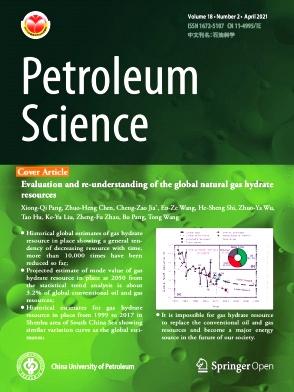一种与生物源纳米二氧化硅结合的热缔合共聚物,可作为低固相钻井液中的新型增粘剂
IF 6.1
1区 工程技术
Q2 ENERGY & FUELS
引用次数: 0
摘要
智能低固相钻井液(slsdf)具有热可控流变特性和引人注目的增稠特性,由于其低地层损害和提高岩屑举升能力,最近引起了人们的广泛关注。然而,由于热缔合聚合物作为添加剂的热不稳定性和环境限制,它们在高温深孔钻井中的应用仍然有限。本研究探讨了从稻壳中提取的热结合聚合物和生物源纳米二氧化硅(B-SiNP)对提高SLSDF热稳定性的协同作用。这项研究表明,基于端乙烯基B-SiNP的纳米杂化TAP-S可能会减轻传统LSDF (F-2)在高温下因热缔合共聚物失效而导致的性能限制。流变试验分析结果表明,在25 ~ 230℃的温度范围内,以接近平凝胶的形态,tac - s钻井液(F-3)可以保持其初始性能(表观粘度、塑性粘度、屈服点和凝胶强度)的5.6倍以上,高于对应的F-2和基础液。此外,TAP-S表现出突变的热增稠特性,其幅度仅下降1.05倍,激活吉布斯自由能为1339 kJ/mol,高于平台(约130°C),反映了其在连续加热过程中的灵敏度低于F-2。因此,DSC分析结果表明,与TAP相比,需要更低的温度来驱动纳米杂化结构中低临界溶液温度(LCST)残余组分的脱水。因此,较低的能量预计会在高温下分解LCST链和周围水分子之间形成的残余氢键。DLS分析表明,TAP-S形成了固体微交联结构网络,具有更稳定的水动力直径。与TAP相比,根据环境扫描电镜结果,TAP- s由更大的复合B-SiNP-TAP集成空间网络结构组成,这赋予了一定程度的导热特性,从而提高了耐温性。根据EPM和粒度分布分析结果,这有助于有效地与膨润土颗粒结合以保护膨润土,并保持相对稳定的膨润土颗粒分散。因此,在恶劣的井下条件下,TAP-S强化钻井液表现出更好的流变性和过滤性能。因此,与B-SiNP结合的热相关共聚物TAP-S可能会成为深井钻井作业中lsdf的环保型增粘剂。本文章由计算机程序翻译,如有差异,请以英文原文为准。
A thermo-associating copolymer integrated with biogenic nanosilica as a novel viscosifier in low solid drilling fluids
Smart low-solid drilling fluids (SLSDFs) with thermo-controllable rheological properties and attractive thickening characteristics have recently captivated profound attention due to their low formation damage and enhanced cuttings lifting capacity. However, their applications to deep hole drilling at high temperatures have remained limited because of the thermal instability and environmental constraints of the thermo-associating polymers as additives. This work explored the synergistic benefits of thermo-associating polymer and biogenic nano-silica (B-SiNP) extracted from rice husk to improve the thermo-stability of SLSDF. This study shows that the nano-hybrid, TAP-S based on vinyl-terminated B-SiNP could potentially mitigate the limiting performance of conventional LSDF (F-2) caused by the failure of thermo-associating copolymers under elevated temperatures. TAP-S bearing drilling fluid (F-3) could preserve more than 5.6-fold of its initial properties (ca. apparent viscosity, plastic viscosity, yield point, and gel strength) with a nearly flat-gel profile in the temperature range of 25–230 °C, which was higher than those of the counterpart F-2 and base fluid according to the results of rheological tests analysis. In addition, TAP-S exhibited an abrupt thermo-thickening characteristic with a magnitude declining by only 1.05-fold and the activation Gibbs free energy of 1339 kJ/mol above the plateau (ca. 130 °C), reflecting its less sensitivity compared to F-2 under a continuous heating process. As a result, a lower temperature was required to drive the dehydration of the residual fraction of lower critical solution temperature (LCST) in nano-hybrid structures than TAP according to the results of DSC analysis. Thus, lower energy was expected to disintegrate the residual hydrogen bonds formed between the LCST chains and surrounding water molecules at elevated temperatures. Moreover, TAP-S formed a solid-micro-crosslinking structure network which exhibited a more stable hydrodynamic diameter as revealed by DLS analysis. Compared with TAP, TAP-S consisted of a larger composite B-SiNP-TAP integrated spatial network structure based on the results of environmental scanning electron microscope, which conferred a degree of thermal conductivity characteristic for improved temperature resistance. This contributed to the effective binding onto bentonite particles for protection and maintained a relatively stable bentonite particle dispersion according to the results of EPM and particle size distribution analyses. Consequently, TAP-S fortified drilling fluid demonstrates improved rheological and filtration performance under severe downhole conditions. Therefore, TAP-S, the thermo-associating copolymer integrated with B-SiNP could find potential application as an eco-friendly viscosifier in LSDFs for deep-well drilling operations.
求助全文
通过发布文献求助,成功后即可免费获取论文全文。
去求助
来源期刊

Petroleum Science
地学-地球化学与地球物理
CiteScore
7.70
自引率
16.10%
发文量
311
审稿时长
63 days
期刊介绍:
Petroleum Science is the only English journal in China on petroleum science and technology that is intended for professionals engaged in petroleum science research and technical applications all over the world, as well as the managerial personnel of oil companies. It covers petroleum geology, petroleum geophysics, petroleum engineering, petrochemistry & chemical engineering, petroleum mechanics, and economic management. It aims to introduce the latest results in oil industry research in China, promote cooperation in petroleum science research between China and the rest of the world, and build a bridge for scientific communication between China and the world.
 求助内容:
求助内容: 应助结果提醒方式:
应助结果提醒方式:


